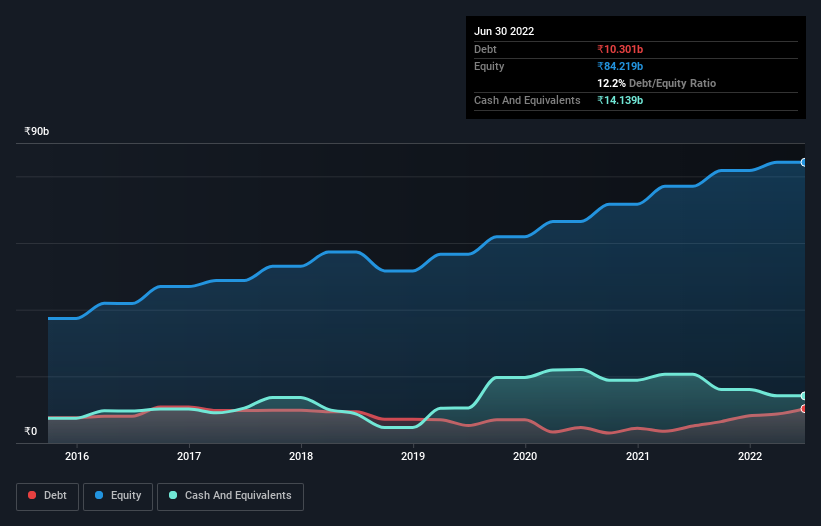
Legendary fund manager Li Lu (who Charlie Munger backed) once said, 'The biggest investment risk is not the volatility of prices, but whether you will suffer a permanent loss of capital.' So it might be obvious that you need to consider debt, when you think about how risky any given stock is, because too much debt can sink a company. We can see that Dabur India Limited (NSE:DABUR) does use debt in its business. But should shareholders be worried about its use of debt?
When Is Debt Dangerous?
Debt assists a business until the business has trouble paying it off, either with new capital or with free cash flow. In the worst case scenario, a company can go bankrupt if it cannot pay its creditors. While that is not too common, we often do see indebted companies permanently diluting shareholders because lenders force them to raise capital at a distressed price. Of course, plenty of companies use debt to fund growth, without any negative consequences. The first thing to do when considering how much debt a business uses is to look at its cash and debt together.
View our latest analysis for Dabur India
What Is Dabur India's Debt?
As you can see below, at the end of March 2022, Dabur India had ₹10.3b of debt, up from ₹5.09b a year ago. Click the image for more detail. But it also has ₹14.1b in cash to offset that, meaning it has ₹3.84b net cash.

A Look At Dabur India's Liabilities
Zooming in on the latest balance sheet data, we can see that Dabur India had liabilities of ₹33.2b due within 12 months and liabilities of ₹5.40b due beyond that. On the other hand, it had cash of ₹14.1b and ₹6.69b worth of receivables due within a year. So its liabilities outweigh the sum of its cash and (near-term) receivables by ₹17.8b.
Having regard to Dabur India's size, it seems that its liquid assets are well balanced with its total liabilities. So it's very unlikely that the ₹1.03t company is short on cash, but still worth keeping an eye on the balance sheet. While it does have liabilities worth noting, Dabur India also has more cash than debt, so we're pretty confident it can manage its debt safely.
The good news is that Dabur India has increased its EBIT by 4.8% over twelve months, which should ease any concerns about debt repayment. The balance sheet is clearly the area to focus on when you are analysing debt. But it is future earnings, more than anything, that will determine Dabur India's ability to maintain a healthy balance sheet going forward. So if you want to see what the professionals think, you might find this free report on analyst profit forecasts to be interesting.
Finally, while the tax-man may adore accounting profits, lenders only accept cold hard cash. Dabur India may have net cash on the balance sheet, but it is still interesting to look at how well the business converts its earnings before interest and tax (EBIT) to free cash flow, because that will influence both its need for, and its capacity to manage debt. Over the last three years, Dabur India recorded free cash flow worth a fulsome 82% of its EBIT, which is stronger than we'd usually expect. That puts it in a very strong position to pay down debt.
Summing Up
While it is always sensible to look at a company's total liabilities, it is very reassuring that Dabur India has ₹3.84b in net cash. The cherry on top was that in converted 82% of that EBIT to free cash flow, bringing in ₹14b. So is Dabur India's debt a risk? It doesn't seem so to us. When analysing debt levels, the balance sheet is the obvious place to start. But ultimately, every company can contain risks that exist outside of the balance sheet. For example - Dabur India has 1 warning sign we think you should be aware of.
Of course, if you're the type of investor who prefers buying stocks without the burden of debt, then don't hesitate to discover our exclusive list of net cash growth stocks, today.
If you're looking to trade Dabur India, open an account with the lowest-cost platform trusted by professionals, Interactive Brokers.
With clients in over 200 countries and territories, and access to 160 markets, IBKR lets you trade stocks, options, futures, forex, bonds and funds from a single integrated account.
Enjoy no hidden fees, no account minimums, and FX conversion rates as low as 0.03%, far better than what most brokers offer.
Sponsored ContentNew: Manage All Your Stock Portfolios in One Place
We've created the ultimate portfolio companion for stock investors, and it's free.
• Connect an unlimited number of Portfolios and see your total in one currency
• Be alerted to new Warning Signs or Risks via email or mobile
• Track the Fair Value of your stocks
Have feedback on this article? Concerned about the content? Get in touch with us directly. Alternatively, email editorial-team (at) simplywallst.com.
This article by Simply Wall St is general in nature. We provide commentary based on historical data and analyst forecasts only using an unbiased methodology and our articles are not intended to be financial advice. It does not constitute a recommendation to buy or sell any stock, and does not take account of your objectives, or your financial situation. We aim to bring you long-term focused analysis driven by fundamental data. Note that our analysis may not factor in the latest price-sensitive company announcements or qualitative material. Simply Wall St has no position in any stocks mentioned.
About NSEI:DABUR
Excellent balance sheet average dividend payer.
Similar Companies
Market Insights
Community Narratives



